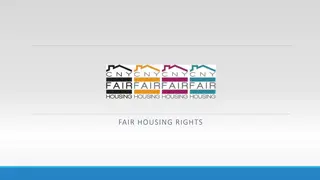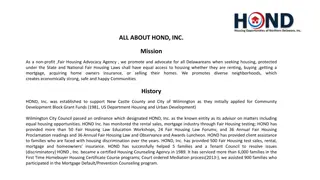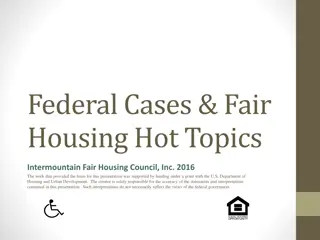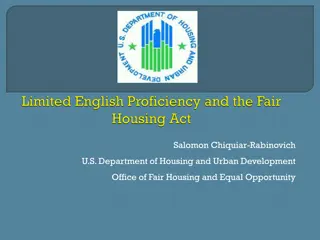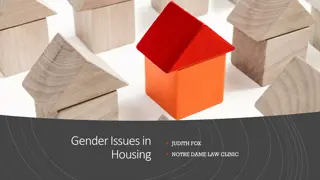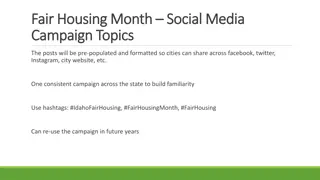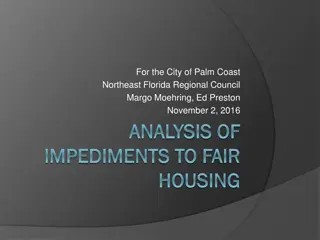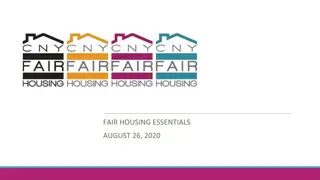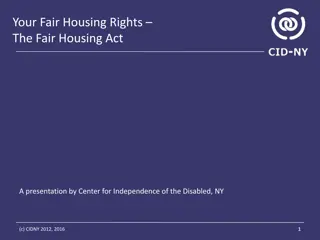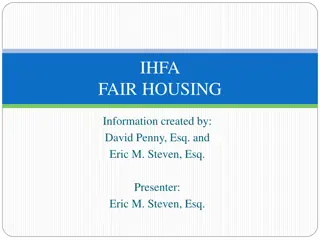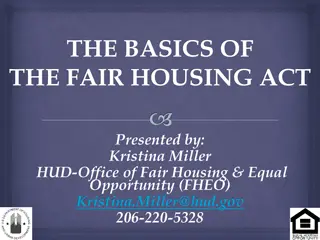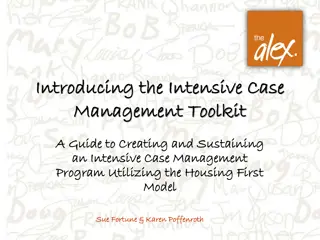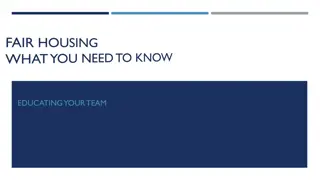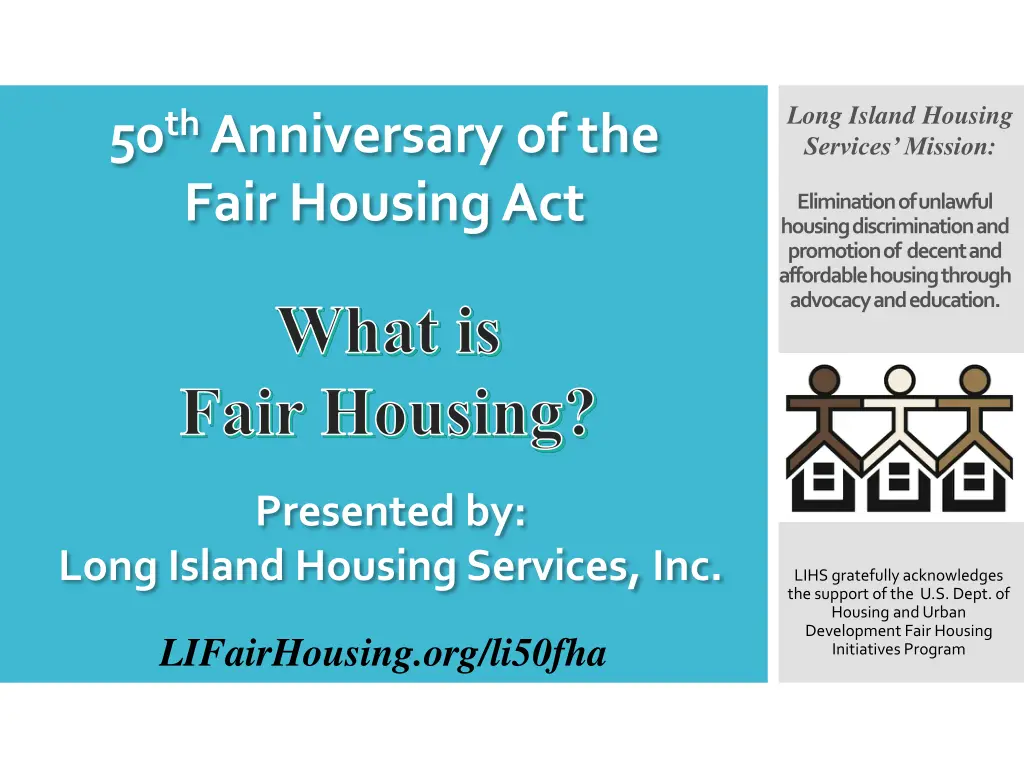
Fair Housing Act Overview: Eliminating Discrimination & Promoting Equal Housing Rights
Learn about the Fair Housing Act, passed in 1968, advocating for equitable housing choice, eliminating discrimination, and ensuring equal access to housing opportunities. Understand the protected categories and laws at the federal and state levels in the U.S., with the mission of Long Island Housing Services towards promoting affordable and decent housing. Explore the significance of fair housing, its core principles, and the efforts to eliminate unlawful housing discrimination.
Download Presentation

Please find below an Image/Link to download the presentation.
The content on the website is provided AS IS for your information and personal use only. It may not be sold, licensed, or shared on other websites without obtaining consent from the author. If you encounter any issues during the download, it is possible that the publisher has removed the file from their server.
You are allowed to download the files provided on this website for personal or commercial use, subject to the condition that they are used lawfully. All files are the property of their respective owners.
The content on the website is provided AS IS for your information and personal use only. It may not be sold, licensed, or shared on other websites without obtaining consent from the author.
E N D
Presentation Transcript
Long Island Housing Services Mission: 50th Anniversary of the Fair Housing Act Elimination of unlawful housing discrimination and promotion of decent and affordable housing through advocacy and education. What is Fair Housing? Presented by: Long Island Housing Services, Inc. LIHS gratefully acknowledges the support of the U.S. Dept. of Housing and Urban Development Fair Housing Initiatives Program LIFairHousing.org/li50fha
Title VIII of the Civil Rights Act of 1968 The Fair Housing Act: In 1968, within a week after the assassination of Rev. Dr. Martin Luther King, the Fair Housing Act was passed.
What is Fair Housing? Fair housing means that all people have the right to live in the housing of their choice that they can afford free from discrimination.* It is U.S. policy and law to promote equitable housing choice and eliminate segregation. *Discrimination: Denial of equal treatment and opportunity
What is Fair Housing? Fair housing laws ensure equal access and mandate that people have equal housing opportunities and not be subjected to discrimination based upon legally protected categories.
Whois protected under the Fair Housing laws ?
U.S. government FAIR HOUSING laws exist on 3 levels: New York State County
It is against Federal (U.S. Government) Fair Housing Law to discriminate in housing because of a person s: Race Color National Origin Religion Disability Familial Status Sex including Sexual Orientation and Gender Identity
In NEW YORKstate, it is also against the law to discriminate in housing because of a person s: Military Status Age (over 18) Creed Arrest** Domestic Violence Victim Marital status Sexual orientation Gender Identity Gender Expression Source of Income* *Source of income includes public assistance, Section 8, SSD, SSI, and court-ordered child support. ** Arrest includes favorably resolved arrest, an adjournment in contemplation of dismissal (ACOD), and a sealed conviction record, or a youthful offender adjudication. In addition to Federal protections on the basis of Race, Color, National Origin, Religion, Sex, Disability, and Familial Status.
In SUFFOLKCounty, it is also against the law to discriminate in housing because of a person s: Veteran Status Group Identity* *Group Identity includes actual or perceived: Age (over 18) Alienage or Citizenship Status Gender Sexual Orientation Military Status In addition to Federal (Race, Color, National Origin, Religion, Sex, Disability, and Familial Status )and New York State (Marital Status, Sexual Orientation, Gender Identity, Gender Expression, Age (over 18), Military Status, Creed) protections. Nassau County has the same protections covered under Federal and State laws.
In NASSAUCounty, it is also against the law to discriminate in housing because of a person s: Ethnicity Veteran Status First Responder Status In addition to Federal (Race, Color, National Origin, Religion, Sex, Disability, and Familial Status )and New York State (Marital Status, Sexual Orientation, Gender Identity, Gender Expression, Age (over 18), Military Status, Creed) protections.
Familial Status Protections Familial Status includes: Someone with 1 or more children under the age of 18 A pregnant woman Foster parents and adoptive parents Someone who has custody or guardianship of a child .
Familial Status Protections The Fair Housing Act makes it illegal to: Require an additional security deposit Segregate families with children (e.g. only downstairs units) Limit or restrict the use of the housing complex s pool, elevators, common areas, etc. Evict a family after a baby is born or adopted .
Sexual Harassment under the Fair Housing Act Discrimination based on sex includes a protection against sexual harassment: Deliberate or repeated unwelcome comments Gestures or physical contact that create a hostile environment Example: Asking for sexual favors in exchange for an apartment, in lieu of rent, offers of reduced rent or extra amenities, etc.
Who is Disabled? Disability means a person who has a physical or mental impairment that substantially limits one or more major life activities. One can have either a history of the impairment or can be viewed by others as having an impairment.
Major Life Activities include: Walking Seeing Hearing Speaking Breathing Learning Working Caring for your daily needs Disability
Providing Documentation of a Disability Generally, a landlord may NOT ask: Do you have a disability? How severe is your disability? May I have permission to see your medical records? Do you take medications? Why do you receive SSI? Disability
Providing Documentation of a Disability If your disability is obvious to others, you should NOT be required to provide documentation. Otherwise you can: Disability Show a copy of your current handicapped parking tag Provide a statement from a doctor, therapist, case manager, peer support group, etc. You should not need to provide copies of your medical records
What types of housing discrimination are prohibited?
refusal to rent or sell Prohibited practices refusal to negotiate making housing unavailable
Prohibited practices denying a dwelling falsely denying housing availability for inspection, rental or sale
Blockbusting Prohibited practices Persuade owners to sell or rent for profit by telling them that persons of a particular race, color, national origin, sex, familial status, religion or disability are moving into the neighborhood. Steering Directing prospective home buyers or tenants to neighborhoods or buildings based on their protected category
Redlining Prohibited practices Unwillingness to lend to applicants or borrowers in particular neighborhoods or geographic regions Reverse Redlining Targeting people in certain geographic areas for disadvantageous or abusive loan terms and conditions
Refusal to make reasonable accommodations Prohibited practices in rules, policies, practices, or services when such accommodations may be necessary for persons with a disability to have equal opportunity, full use and enjoyment of a dwelling Example: Because of a vision impairment, a tenant requests permission to have a guide dog with her in her apartment. The housing provider has a no-pets policy. This is a request for a reasonable accommodation, and the housing provider must grant the accommodation.
Refusing to allow for reasonable modifications Prohibited practices to properties when such modifications to structures are required by a person with a disability to allow them full use and access to a rental unit or common area, at the expense of the person with a disability Example: Because of a mobility disability, a tenant wants to install grab bars in the bathroom. This is a reasonable modification and must be permitted at the tenant s expense. *Note- In 2010, New York State Human Rights Law was modified to recognize that modifications are accommodations. It also placed the expense on providers for modifications to common and public use space
Examples: Unlawful advertising discrimination: verbal, printed, or graphic Prohibited practices no children mature persons suitable for singles only Christians Only English Speakers Only Ideal for a couple Must have employment income No Section 8 No Programs Logos that represent a particular race or religion, e.g. pictures featuring only White tenants.
Examples: Unlawful Terms and Conditions Prohibited practices Applying different standards and rules related to eviction, attempted eviction or non- renewal of a lease Treating tenants differently in relation to repairs, lease violation notices and late fees
Retaliation Prohibited Practices Coercion, intimidation, threats and interference Against persons who have exercised their Fair Housing rights Against persons who have acted as a witness or aided others to exercise their Fair Housing rights
Prohibited Practices for Financing, Brokerage, and Appraisal Services Refusing to make a mortgage loan Refusing to provide information regarding loans Setting different terms or conditions of financing Refusing to purchase a loan Denying access to brokerage services .
Examples: Discriminatory Statements: I don t think it s safe for you to live here because of your disability. I don t rent to families with children. I won t rent a one-bedroom apartment to parent and child. I don t rent to African Americans, Hispanics, Jews etc. I don t want foreigners living in my complex. It s not safe for young children because there are stairs. No Programs accepted. .
Examples: Discriminatory Harassment: Sexual (gender), racial, ethnic, religious, disability or familial status harassment by the owner, employees of owner, the management company, employees of the management company, or other tenants. Wouldn t you be more comfortable somewhere else?
What types of housing are covered by the federal FAIR HOUSING ACT?
Housing covered by the federal Fair Housing Act Single Family Homes Single Family homes owned by private persons when a real estate broker and/or discriminatory advertisingis used to sell or rent the home Single Family homes not owned by private persons (for example, owned by corporations or partnerships) even if a broker is not used to sell or rent the home
Housing covered by the federal Fair Housing Act Multifamily Dwellings Multifamily dwellings with5 or more units, including rooming houses Multifamily dwellings with 4 or fewer units, if the owner does not live in one of the units.* *NYSHRL covers three or more units
Other types of dwellings covered under the Fair Housing Act Group Homes Nursing Homes Assisted Living Facilities Residential Hotels Dormitories Condos and Cooperatives Manufactured and Mobile Homes .
How do we overcome fair housing challenges
Fair Education Housing Strategies Advocacy Enforcement
How Do You Protect Your Fair Housing Rights? Anyone who believes he or she has been discriminated against can file a complaint. If you want to discuss options, or obtain help from a professional Fair Housing advocate Contact Long Island Housing Services, Inc. (631) 567-5111 ext. 375 info@LIFairHousing.org
Protecting Your Fair Housing Rights *This chart is for administrative complaints, not judicial complaints filed in Federal District Court or NYS Supreme Court. Statute of Limitations: Administrative Complaint= 1 year and Federal Court = 2 years
Call Long Island Housing Services, Inc. 631-567-5111 ext. 375 info@LIFairHousing.org Federal U.S. Department of Housing and Urban Development New York FHEO Office 26 Federal Plaza, Room 3532 New York, NY 10278-0068 https://www.hud.gov/program_offices/fair_housing_equal_opp/online- complaint Nassau County Nassau County Commission on Human Rights 240 Old County Road Mineola, NY 11501 https://www.nassaucountyny.gov/414/Human-Rights-Commission State N.Y. State Division of Human Rights One Fordham Plaza, 4th Floor Bronx, NY 10458 https://dhr.ny.gov/complaint Suffolk County Suffolk County Human Rights Commission 100 Veterans Memorial Highway Suite #1 Hauppauge, NY 11788 http://www.suffolkcountyny.gov/Departments/HumanRightsCommissio n/ComplaintProcess.aspx
Fair Housing Laws Federal Laws: Fair Housing Act Title VIII of the Civil Rights Act of 1968 Fair Housing Amendments Act Passed in 1988 Added provisions related to familial status and disability
Fair Housing Laws New York State Human Rights Law: N.Y. Executive Law Section 290 et seq. Nassau County Human Rights Law Local Law: 9-2006 eff.1-07 Suffolk County Human Rights Law: Local Law No. 58-2014 eff. 1-21-15
Long Island Housing Services, Inc. 631-567-5111 ext. 375 info@LIFairHousing.org Updated March 2019. LIFairHousing.org/li50fha

